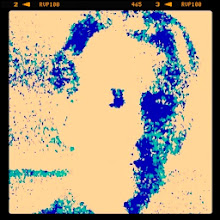Nelson is a new comics anthology from
Blank Slate Books, in which 54 leading UK comics artists come together to tell one 250 page story, following a character called Nell Baker from her birth in 1968 to the present day. Each artist gets to write and draw one four page chapter, telling the events of a single day in a particular year, and gradually building up not only the story of Nell's life but a portrait of Britain over the last 43 years. The story is basically social realist, but the styles of artwork vary widely...
Although the book is based on an original idea by
Rob Davies (and co-edited by him and
Woodrow Phoenix) the individual artists seem to have been pretty much responsible for the events described in each segment. This makes the tone very changeable, one minute funny, the next sad, sometimes just downright puzzling. Things that look as if they're going to be important plot elements in one chapter are ignored in the next, but may surface again ten or twenty years on. And this is A Good Thing, because it makes
Nelson feel like a real life, packed with random moments, odd encounters and curious coincidences.
 |
| Rob Davies |
Inevitably, as with any anthology, there were some contributors whose work appealed to me more than others, but that's just a matter of personal taste. I really liked
John McNaught's almost wordless 3 pages, filling us in on what Nell's absent dad is up to in 1993, and also the way that
Simon Gane, in the 1992 chapter, picks up and runs with something that
Sarah McIntyre left hanging way back in 1973.
Gary Northfield and
Jamie Smart bring a lovely sense of fun and anarchy to Nell's pre-school years.
 |
| Jamie Smart |
The period detail is nicely handled: here and there historical events intrude into the story (the moon landing, the miners' strike of '84) but mostly it's the background details of clothes, cars, adverts etc which anchor each episode in its particular year. I'm only two years older than Nell, and the depictions of the '70s and '80s rang true to me. (Interestingly there's no mention of the Falklands War, nor of the Great Storm of 1987, which used to be a regular feature in stories about the '80s, standing for the collapse of Thatcherism and all sorts of Important Stuff.)
As the story moves towards the present day, however, the treatment of real events becomes less subtle and moments of historical importance start to barge their way into the foreground. (9/11! The London Tube Bombings! The Great Icelandic Volcano Sneeze!) I don't think that's a reflection on the people who wrote and drew the later chapters, but rather a sign of how difficult it is to write about the present and the recent past. The '70s and '80s are far enough away now that we can see what they were about, but it's sometimes hard to make out more recent years through the thickets of headlines.
 |
| Simon Gane |
There's also a slight tendency to miserablism in the later chapters. The young Nell is a comics fan (
Luke Pearson's chapter includes a lovely panel of her gazing at a rack filled with all the comics of my childhood, the
Dandy, the
Beano, The
Victor, the
Beezer,
Krazy, Battle...) and as she comes of age and heads off to art college I started to think that we were seeing the coming-of-age story of a comics artist. But things don't work out for Nell; real life gets in the way, and her ambitions seem to fade away. It's odd that when you bring together 54 of this country's most talented and hard working artists, all of whom have succeeded in making a name for themselves in comics, they end up telling a story of artistic
failure. It smacks of the bleak worldview that runs through a lot of British movies and high-end TV dramas , and I suspect it comes from a feeling that in order to be thought Serious a story needs to be A Bit Depressing.
Not
too depressing in this case, though, because the lively drawings and ever-changing styles are always a treat, and when one author takes the story in a glum direction there's usually another along shortly who'll have something funny or heartwarming happen instead. And some of the darker elements, like one character's descent into homelessness, are handled very well; sad and thought provoking without being mawkish or preachy.
At the end
Rob Davies, who penned the first chapter, takes over again to deliver a wry ending which doesn't trouble itself with the big events of 2011 but concentrates instead on the stuff that's really important; friendship; family; memory. It all adds up to a fantastic communal achievement, and deserves to be widely read.
Nelson costs £18.99 (or £24.99 for the de-luxe hardback edition) and should be available wherever good comics are sold, or direct from
Blank Slate. All profits go to Shelter, the Housing and Homelessness charity. (I should probably point out that it's not suitable for children.)







No comments:
Post a Comment